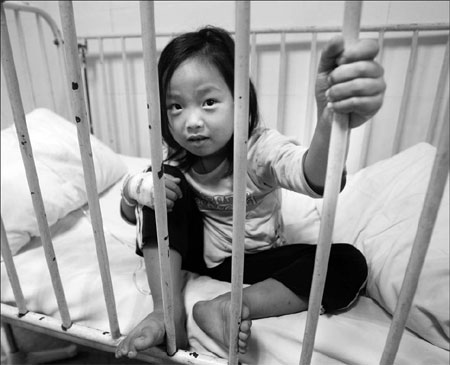Three people have died and 17 others were hospitalized in Dongyang city, Zhejiang province, due to the illegal handling of toxic waste from a factory that manufactures plastics.
|

|
|
Li Jiangyue, a four-year-old girl in Shangwu village, Dongyang, receives treatment after playing near chemical waste at a garbage collection center. |
"After the preliminary investigation, and according to the autopsies, we know that the problem is dinitrophenol poisoning," said Liu Xiaohong, an official from Dongyang government.
"Dinitrophenol is usually found in chemical waste," Huang Weidong, director of emergency department in Zhejiang No. 1 Hospital, told China Daily. Only 0.2 g of dinitrophenol can kill a person, Huang said. The chemical is widely used to produce industrial dye.
Four people from Dongyang Organic Synthesis Chemical No. 2 Factory, which illegally released the chemical waste, were detained by local police office.
The business and those responsible will be punished according to the law, according to a press release from the Dongyang government yesterday afternoon.
The government investigation shows that factory officials ordered workers to transfer a batch of plastic bags, which used to contain dinitrophenol, to a waste collector surnamed Ren in Jinzhai village. Ren later sold this waste to a businessman surnamed Wang from Huashui town.
Neither Ren nor Wang knew that the bags contained toxic waste.
Due to a lack of proper protection during the transit, Wang's workers fell sick when they were loading these plastic bags on Sept 13.
They showed symptoms of dizziness, sweating, nausea, fever and yellowish skin. One worker died before medical intervention arrived.
Several children who had exposure to the chemical waste also fell sick, one after another.
Two other workers died within the first hour of arriving at the hospital, Huang said.
Several patients are receiving treatment and four of them are in intensive care unit, he said. The others are all stable, said Huang.
No antidote to the poisonous chemicals exists, so the medical staff can only treat the patients' symptoms, he said.
"All of the four children are stable, but we're still running a few more related tests," said a Zhejiang Children's Hospital spokesperson.
"We will monitor them for 72 hours just in case. As this is the first case of this chemical poisoning at our hospital, we're being cautious in our actions."
The children in the hospital were only playing around the chemical waste and didn't have close contact with it, Wang told China Daily.
Local government officials are investigating the accident and took emergency reactions after the workers fell ill. Officials are also reviewing the regulations about waste collection to prevent similar accidents. Dongyang government plan to send all the people who had exposure to the chemical waste to the hospital for examination.
Dongyang is a city of about 800,000 people in the middle of Zhejiang province.
The city has a wide range of industrial sectors, led by the manufacture of electronics, magnetic materials, medicines and chemicals.
(China Daily September 16, 2009)